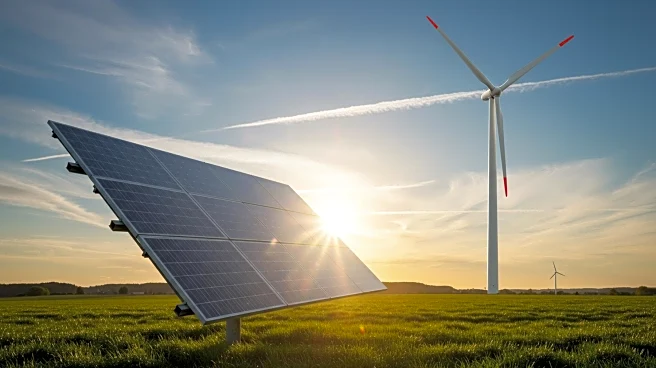What's Happening?
The Trump administration has imposed a 50% tariff on Indian imports, which experts suggest could accelerate India's green manufacturing efforts. Despite potential disruptions to sectors like textiles, steel, and aluminum, the tariffs may redirect clean tech products intended for the U.S. to India's domestic market, boosting renewable energy deployment. India remains committed to its climate goals, having achieved significant progress in non-fossil fuel energy production. Experts argue that this situation presents an opportunity for India to enhance its manufacturing capabilities and reduce costs, positioning itself competitively in the global market.
Why It's Important?
The tariffs imposed by the Trump administration could have significant implications for India's clean energy sector. While they may increase costs and disrupt exports in the short term, they also offer India a chance to strengthen its domestic manufacturing base and accelerate its transition to renewable energy. This shift could enhance India's competitiveness in the global market, particularly as Europe seeks allies in its net-zero agenda. The situation underscores the complex interplay between trade policies and climate commitments, highlighting the need for strategic adjustments in India's production and trade policies.
What's Next?
India may need to focus on improving its logistics and manufacturing efficiencies to capitalize on this opportunity. The European Union's upcoming Carbon Border Adjustment Mechanism could further influence India's trade dynamics, necessitating the development of zero- or low-carbon industrial zones. As global markets face uncertainty due to additional tariffs, India has the potential to expand its role in renewable energy supply chains, particularly in electronics, biofuels, solar panels, and green steel. Strategic investments now could provide Indian firms with a competitive edge in the long term.
Beyond the Headlines
The situation highlights the broader geopolitical tensions affecting global trade and climate policies. India's steadfast commitment to its climate goals, despite trade upheavals, reflects its determination to balance economic growth with environmental sustainability. The tariffs could serve as a catalyst for India to address inefficiencies in its production base, similar to China's past strategies, ensuring it does not miss this critical window of opportunity.











